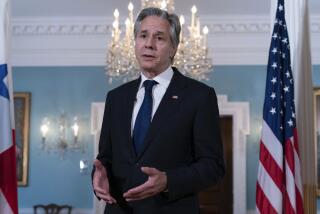U.S. Aid to E. Germany Depends on Reform, Baker Says : East Bloc: ‘It would be wrong’ to have a different standard than for Poland and Hungary, he asserts.
- Share via
WASHINGTON — The Bush Administration would employ a carrot-and-stick approach for any economic aid that it might make available to East Germany, with the assistance contingent on reforms, Secretary of State James A. Baker III said Sunday.
“It would be wrong to have a different standard for East Germany than we do for Poland and Hungary,” Baker said, referring to U.S. aid packages to those nations.
Last month, the House passed an $837-million package to help reform-minded Poland and Hungary--almost twice what the Bush Administration had proposed.
But the Administration is clearly putting conditions on any U.S. involvement in helping East Germany’s troubled economy.
“It would be wrong to start funneling economic assistance to any country in Eastern Europe, I think, even if we had it to funnel--and we are somewhat constrained in what we can do--before there is clear evidence that they want to reform their economic system,” said Baker on ABC-TV’s “This Week with David Brinkley.”
“What we have here is a rather significant event in political terms, but it doesn’t mean a whole lot in economic terms,” Baker added.
Both Poland and Hungary have inaugurated significant reforms this year, with Poland installing a non-Communist government and Hungary declaring itself a multi-party republic. East Germany has promised to hold elections but remains, for now, a one-party Communist state.
Administration officials also warned Sunday against “premature” speculation about the reunification of Germany despite the recent opening of border crossings between East and West Germany.
“It is premature to jump, to make the great leap--and it is a big leap--from the right of free travel on the part of East Germans to the question of reunification,” Baker said.
“There are many things that have to take place in between. One of those is fair and free and even multi-party elections in East Germany. Another is movement toward a free economic system, free markets, free enterprise.”
Former West German Chancellor Helmut Schmidt predicted that German reunification might not happen until “the next century.” Speaking on NBC-TV’s “Meet the Press,” Schmidt said the primary challenge is to help Eastern Europeans establish a functioning economy, or else “the whole process might be slithering away.”
Soviet Foreign Ministry spokesman Gennady I. Gerasimov, on CBS-TV’s “Face the Nation,” said: “There is not much enthusiasm in other quarters concerning a reunited Germany.”
Although President Bush has been criticized for reacting too slowly to reforms in Eastern Europe and the Soviet Union, Gerasimov said, “I think he’s handling it as a real statesman.” He also predicted that the United States and the Soviet Union “may come to a common ground” at the superpower meeting next month in the Mediterranean because “everybody is interested in stability, in not too much upheaval in Europe.”
Administration officials continued to urge a strong and cautious approach to the Soviet Union.
Asked whether the Administration would consider economic assistance to the Soviet Union, Baker responded that the Soviet Union must work more toward arms control and do more to solve regional conflicts. He added that the Soviets “won’t ask us for American cash. Technical economic advice is what we’re talking about, not American financial assistance.”
Baker said that he had laid down conditions in talks with Soviet officials. “If you expect cooperation from us, if you expect us to move from competition through dialogue to cooperation, we need to see cooperation in Central America, for instance.”
Cheney, speaking on “Meet the Press,” went even further.
“I think we have to be cautious here. I think it’s one thing to encourage the Soviet Union to continue its reforms, but we have to remember that the Soviets still have thousands of nuclear weapons aimed at the United States; that they still occupy Eastern Europe; that, for example, the guerrillas who this morning attacked the government of El Salvador in San Salvador are supported by Nicaragua and Cuba, and Nicaragua and Cuba are kept alive by an infusion of billions of rubles from the Soviet Union.
“As long as they pursue those policies, I don’t think the United States ought to be in a position of providing material assistance to the Soviets,” Cheney said.
More to Read
Get the L.A. Times Politics newsletter
Deeply reported insights into legislation, politics and policy from Sacramento, Washington and beyond. In your inbox twice per week.
You may occasionally receive promotional content from the Los Angeles Times.









